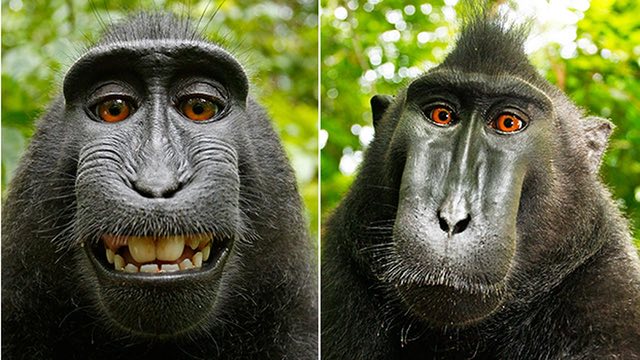Indonesia’s ‘selfie monkey’ threatened by hunger for its meat

The crested black macaque shot to fame when one of the monkeys snapped grinning selfies and became embroiled in a US court battle — but the tussle over copyright is the least of the rare animal's worries. In a remote corner of their native Indonesia, amid smoking volcanoes and dense jungles, the monkeys face a far greater threat as they are aggressively hunted to be eaten. "In other places some macaque species are facing extinction because of shrinking habitat," Yunita Siwi from Selamatkan Yaki, a foundation that campaigns to protect the primate, told AFP. "But here the habitat is getting smaller — and people are eating the monkeys." Authorities and activists are stepping up efforts to persuade villagers on Sulawesi island to stop consuming the critically endangered monkeys, one of many exotic creatures that form part of the local indigenous community's diet. The animal, whose scientific name is Macaca nigra, is part of a kaleidoscope of exotic wildlife found across Indonesia, including tigers and orangutans, who face a range of threats from poachers to the destruction of their habitat. On a recent trip to Sulawesi's Tangkoko nature reserve, some of the amber-eyed, black-haired macaques, known in the local language as "yaki", frolicked in a small river while others climbed palm trees and knocked coconuts to the ground. Among those living in Tangkoko is Naruto, who shot to fame after grabbing a British wildlife photographer's camera and snapping some selfies. The pictures led to a legal fight after animal rights activists PETA brought the case to a San Francisco court arguing that Naruto should own the copyright — a claim rejected by a judge last year. The approximately 2,000 monkeys living in the 8,800-hectare (21,750-acre) reserve enjoy protection because they are in a restricted area, but that is not the case for about 3,000 others estimated to be in jungles elsewhere in the province of North Sulawesi. The macaque's meat is prized by the ethnic Minahasan people, a largely Christian group in the world's most populous Muslim-majority country, who have no reservation about eating exotic animals, unlike Indonesia's Islamic communities. "I like the taste, hot and spicy, it is similar to wild boar or dog," Nita, a 32-year-old local Minahasan who gave only her first name, told AFP. At a market in Tomohon city, a stomach-churning array of burnt, mutilated animals were on offer. Black crested macaques — flame-roasted and whole, with pained grimaces etched on their faces — were on tables for sale alongside piles of sliced-open pythons, burnt bats and dogs. The macaques and some other animals at the market are protected by Indonesian law and officials have in the past raided the site, leading to violent clashes with vendors. But the trade in exotic creatures was still booming during a recent visit, with some local travel agents even offering tours to adventurous foreign travellers. The demand for the meat has prompted Minahasan hunters to go far and wide in search of the macaque, heading in pickups to remote parts of the island.
Read More: http://www.daily-sun.com/post/216864/Indonesias-selfie-monkey-threatened-by-hunger-for-its-meat

